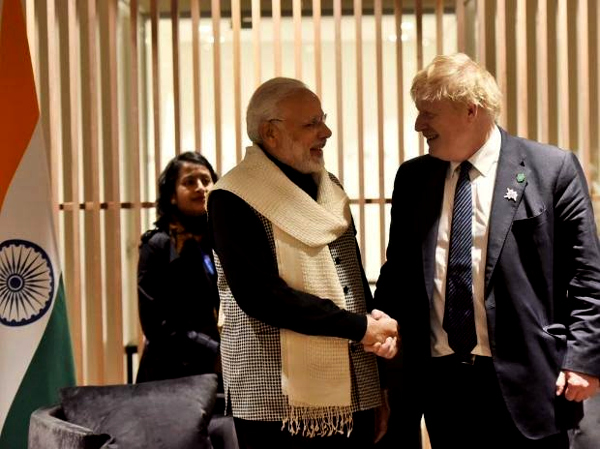A free trade agreement with India will be top the agenda of the new Boris Johnson government after the Conservative Party won a landslide victory in Thursday’s election and re-starts the Brexit process to leave the European Union on January 31.
Johnson, who has had family ties with India through his former wife Marina Wheeler, has carried forward the Conservative Party’s ‘India doctrine’ initiated by former leader David Cameron since 2005, exerting to win support from the Indian community in the UK.
Conservative leaders hinted during the election campaign that if elected, one of Johnson’s first foreign visits as the prime minister is likely to be India. He has often mentioned the prospect and benefits to the UK of a free trade agreement with India.
Driven by history and post-colonial realities, India and the UK have close relations in a range of areas, including defence, trade, technology, investment, and human resources. Nearly 900 Indian companies have offices in the UK, investing in the country and operating world-wide from their UK base.
Promising to deliver a “truly special UK-India relationship”, Johnson said during the campaign: “When I was with Prime Minister Modi I stressed that the UK and India are two modern democracies who should work closely together to promote trade and prosperity, improve global security and tackle the challenges our countries face.”
Visiting the Neasden temple over the weekend, Johnson mentioned his personal relationship with ‘Narendra bhai’, and hailed the contribution of the 1.5 million-strong Indian community, without which, according to him, “the UK would be lesser in so many ways”.
Johnson, who appointed three Indian-origin MPs to senior positions and is likely to retain them – Priti Patel (home secretary), Alok Sharma (international development secretary) and Rishi Sunak (chief secretary to the Treasury) – has already announced post-Brexit immigration plans likely to benefit Indian professionals and students.
The Conservative Party, which was long seen as the ‘nasty party’ by earlier generations of Indian immigrants who preferred Labour, increased its tally of MPs from the community from five to seven, matching those of Labour.
Johnson and the Conservative Party’s pro-India approach stood in stark contrast with that of Labour during the election, particularly on the latter’s stand on Kashmir under its leader, Jeremy Corbyn. Sections of the community termed the party ‘anti-India’ and campaigned against its candidates.
Source: HT
Image Courtesy: Business Standard
You may also like
-
IAF Aircraft Set Course For Exercise Eastern Bridge VII At Oman
-
India-us Working Together In Areas Like Critical Minerals, Supply Chains And Advanced Technologies: Shri Piyush Goyal
-
Defence Secretary to co-chair 5th India-Philippines Joint Defence Cooperation Committee meeting in Manila
-
2nd India-Japan Finance Dialogue held in Tokyo on 6th September, 2024
-
Prime Minister, Shri Narendra Modi welcomes Crown Prince of Abu Dhabi
